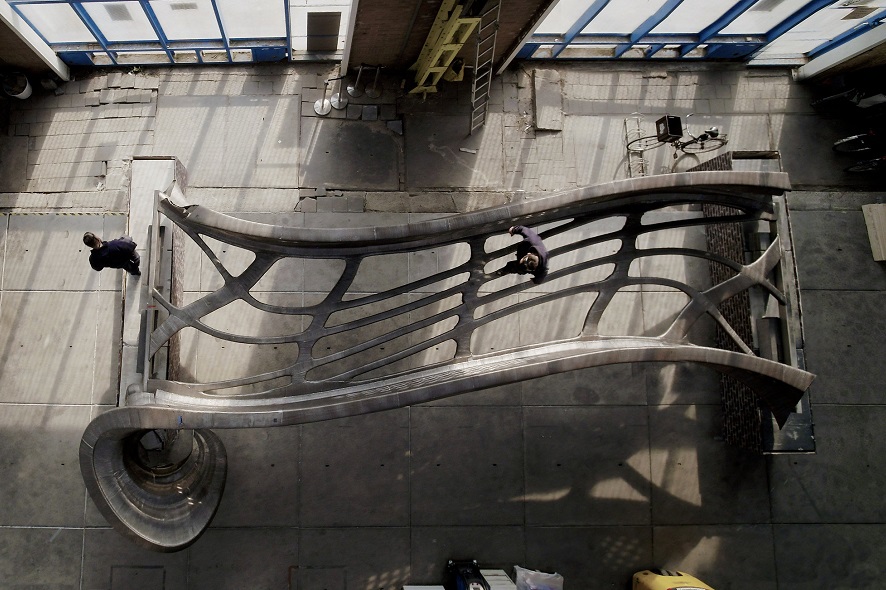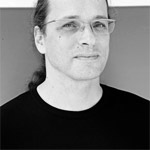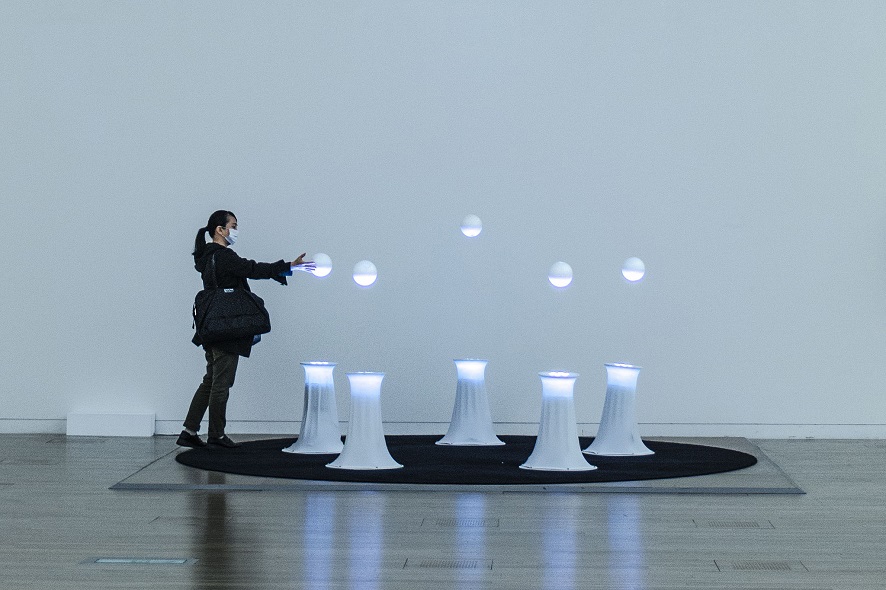While “Error in Progress” is exhibiting art in the old bunker in the bowels of POSTCITY Linz and the Upper Level is serving as the setting for scientific-technological projects and their takes on fakes and mistakes, thinkers will be gathering in the Conference Hall in between to consider Error – the Art of Imperfection from theoretical points of view. On three days, experts from throughout the world will discuss and shed light on all the multifarious facets of human error and intentional fakery.
Kicking things off is the Opening Symposium on Thursday, September 6, 2018, followed by the big Theme Symposium on Festival Friday. On Sunday, two events, Academy of Error and Trials and Error in Art & Science, will elaborate on blunders in science and art. In this interview, artistic director Gerfried Stocker and project manager Karla Spiluttini tell us a bit about some of the speakers we can look forward to.
Each annual Ars Electronica Festival hosts a variety of conferences and talks that take an intensive theoretical approach to the festival theme. What awaits us in 2018?
Gerfried Stocker: Symposia, conferences and speeches are highlights of every Ars Electronica Festival, and, of course, the Theme Symposia constitute the centerpiece, an in-depth encounter with the year’s theme. The main events are grouped on three days. It kicks off on Thursday with the Opening Symposium, continues on Friday, which is always the day of the Theme Symposium, and winds up on Sunday with two event clusters that take a more playful approach to the Error theme: the first is the Academy of Error that will scrutinize science’s approach to making mistakes and how it deals with them; the second is entitled Trial and Error in Art & Science and analyzes the manifold experiences that are constantly emerging at the nexus of art and science, and the importance of risk-taking for innovation. Many international experts will be gathering in Linz on these three days!
So, the Opening Symposium on Friday will deliver initial insights…
Gerfried Stocker: This year, it’s really designed to be a sort of teaser, with many of the speakers giving more detailed and comprehensive presentations over the coming days. Here, we’ll limn the prospects that are the festival’s points of departure. These experts will subsequently be the main protagonists—as keynote speakers or at various panel discussions and workshops.
Tell us about some of the stars of the Theme Symposium.
Karla Spiluttini: The Theme Symposium on Friday will start with an examination of the phenomenology of error by three extraordinary speakers: Thomas Macho, a philosopher and scholar of cultural studies, will talk about the cultural history of error; biologist Nathan Lents has written a book about human error, so he’ll deal with the biological aspects; and journalist Meredith Broussard, author of the book “Artificial Unintelligence,” will approach error from the technological side. We’ll conclude with a presentation of this year’s two STARTS Prize recipients, both of which are characterized by greater readiness to accept risk as a way to overcome error.
Gerfried Stocker: The mission of the STARTS Initiative is to support what could very well be termed risky experimentation. Such undertakings are initiated with an open attitude—that is, those involved don’t really know what will come of a combination artistic, technical and commercial intentions. This is a lovely example of how the European Commission is focusing increasing attention on the importance of higher risk tolerance for innovation and future development.

STARTS winners: Amsterdam’s 3D Printed Steel Bridge / MX3D & Joris Laarman Lab. Credit: Thijs Wolzak
A fascinating afternoon lineup awaits festivalgoers as well.
Karla Spiluttini: After lunch, we go deeper into the theme. Philosopher Regina Rini will show examples from her research on fakes and misinformation in social media, journalist Ariana Dongus will tell about how refugees are forced to undergo iris scans as a condition for receiving social services, and biologist Ernst Hafen will talk about how we can live up to our responsibility for the biological data we produce in mass quantities. Then we’ve scheduled brief Get Inspired presentations that demonstrate responsible, strategic approaches to innovation.
Gerfried Stocker: As we’ve gone about our work on the festival theme, a consideration that has, to an increasing extent, insinuated itself upon us is the question of what has gone so terribly wrong with the Digital Revolution. What are the prospects of responsible innovation? What are strategies to restore data autonomy, self-determination over our own digital persona online? The matter of fakery is relevant—the festival focuses on error, of course, but we’ll also pay attention to fakes, intentional efforts to deceive people and propagate fallacies. These can be juxtaposed to errors, to failure. And there are many examples that very clearly show how we’ve failed to a considerable extent to make this digital culture a really positive, people-oriented, anthropocentric culture. I think all of this will be an important part of our afternoon activities.
The same way that this year’s Theme Exhibition moves between fake and error…
Gerfried Stocker: Exactly. One of the interesting things about programming a festival like this is that you have the theme as your lodestar, but you can also bring in ancillary aspects in the exhibitions and theoretical elaborations. We can turn over the podium to theoreticians but we also enable artists to have their say. That’s also the beautiful thing about the morning sessions—after three profound reflections on facets of the Error theme, we’ll showcase two examples from current artistic/scientific practice.
There are many strategies to come to terms with mistakes. One is antifragility. So, what is that?
Karla Spiluttini: Antifragility can be contrasted to the fragility that is evoked by errors. Human fragility and the mistakes that occur make people cognizant of whether they happened intentionally or unintentionally. This was an important step for innovation and the trial-and-error approach by means of which we could make both social and technical progress.
Gerfried Stocker: I believe that this is also the interesting consideration—coming to the insight as to why human beings began to develop technologies. We’ve arrived at a point at which it can be quickly and easily said that technology itself is the problem. But you always have to keep in mind that behind it are people who need technology. It’s a basic element of our survival strategy. And I consider this concept of fragility and antifragility a fascinating new way to look at the idea of resilience, which has been a fashionable buzzword in recent years. But now we’re in a situation in which a high degree of vulnerability has emerged, both on the part of individuals and throughout society. This is attributable to us having made ourselves dependent on technical systems,and we’re about to intensify this in the near future. In reality, we shouldn’t focus on strategies to prevent this but rather on those that enable us to better survive in this situation.
What’s on the curriculum at the Academy of Error on Sunday?
Gerfried Stocker: You can always count on Ars Electronica always focusing on crossovers of art, science and technology and their social background. Accordingly, we’re starting the first session with a whimsical look at academia and the classic sciences. We want to ask practitioners in this field, who are usually highly “allergic” to fallacies and errors—and for good reason—how they deal with this theme. We don’t want to hear about their insights and achievements but about their most productive flops.
Physicist Michael Doser, an antimatter specialist at CERN, will moderate this session. The attendees include quantum physicists and neuroscientists, as well as scholars in the social sciences. And artists will be on hand—for instance, Sputniko!, a Japanese-American artist. She’s been working for many years with computer science and also doing environmental research, and she’ll show a project at the transition zone between art and technology. The Academy of Error is sure to be a very exciting juxtaposition, because naturally, as we’ll see, it depends on their personalities how people react in such situations and the extent to which they perhaps even seek errors. For scientists, error is something great because it opens up possibilities to take new routes and conceive new models.
Isn’t the possibility of errors an inherent part of science, and thus errors are building blocks of research?
Gerfried Stocker: Yes and no. The noble concept that science is free of dogma does indeed exist. But as soon as science takes leave of its discrete realm because economic aspects are at stake, because science is also there to be applied, then an enormous uncanny pressure emerges. We’re constantly talking about the freedom and latitude necessary for innovation, but where in our society are we prepared to permit this? Where is science correspondingly supported and commensurately financed? This will definitely be one of the big issues of this session: Is science actually this place in which to take leave of conventional thinking to arrive at new realizations, or is the pressure too high there? This is fascinating in all areas because, throughout the week, we’ll be talking to artists, scientists and entrepreneurs about what it means to fail in their field. It sounds lovely to say that we have to learn to deal with the mistakes we make, but what does this actually mean for my career? Is it really so nice when you fall for a fallacy?

Hiroshi Ishii. Credit: Florian Voggeneder
We continue on Sunday afternoon with Trial and Error in Art & Science. What’s this all about?
Gerfried Stocker: This is about the field of tension and productive interplay between art and science. We’ve lined up some really great protagonists such as Hiroshi Ishii of the MIT Media Lab and the Ars Electronica Futurelab’s Horst Hörtner. We want to scrutinize how this plays out in artistic practice: Is this mode of dealing with error, this readiness to take risks, a myth, or is it actually operational and productive? One area we want to particularly concentrate on is Space Art. Especially in space travel research, the idea of an error is obviously extremely dramatic. Even if it’s only a minor glitch, the possibilities of repair, improvisation or jerry-rigging are considerably less when you’re in outer space. On the other hand, our general perception of space travel is characterized above all by accidents, breakdowns and errors, not least of all due to their exaggeration and glorification in Hollywood films. If I as an artist decide to work in the field of space travel research, then I have to be prepared to take risks. This is a supremely marginal theme, a niche topic, in which things are possible only with huge financial outlays and that demands compliance with an extraordinarily large number of framework conditions and criteria. To behold what this looks like in actual practice will be the main theme of this session.
Gerfried, in an interview on the Ars Electronica Blog, you asserted that the next big step towards taking advantage of errors’ potential would be to develop our social and ethical intelligence. What did you mean by that?
Gerfried Stocker: This line—from artificial intelligence to social intelligence—was intentionally formulated in succinct, simplistic terms. It was meant to express the fact that it’s not sufficient to endeavor to further develop technology and produce consummate adaptive programs, neuronal networks and artificial intelligence. Instead, what is perhaps the considerably greater challenge, humankind’s bigger, more important project, is to further develop ourselves. Until we’re so technically advanced, how can we use the time to develop ourselves, socially as well as individually, so that we really accept responsibility for that which we are now beginning? We, personally and as a whole society, must assume and accept responsibility for our technologies. This is something that has emerged so strongly during the work on the theme over the last seven months—the feeling that we haven’t come to adequately appreciate that we bear responsibility for what we do and can do. We increasingly proceed from an amorphous fear of technology to the mindset that it’s our responsibility, our purview of authority, how we deal with it. For me, this is a fascinating moment in time because this is actually the great prospect of hope for the future. And I believe that it’s incumbent upon me to once again argue on behalf of regarding technology neither as the question nor the answer, but rather as a superb tool, an outstanding medium, a field of fascination and fun, a sandbox in which you can play and discover things. The thing about it that we must never forget is our role as human being and society.

Karla Spiluttini is a media artist and researcher. Her artistic and scientific interests lie in diffuse locations, materials research, narrative spaces and the phenomenology of Maker Cultures. Her installations have been awarded the Salzburg State Prize for Media Art and the Mandala Award of the European Institute for the Media. Among other things, she worked with materials and applied experimentation as the 2012 Research Resident at the V2_ institute for the unstable media in Rotterdam, and as an intermediary at various Austrian universities. She is currently working for the Ars Electronica Festival in Linz.

Gerfried Stocker is a media artist and telecommunications engineer. In 1991, he founded x-space, a team formed to carry out interdisciplinary projects, which went on to produce numerous installations and performances featuring elements of interaction, robotics and telecommunications. Since 1995, Gerfried Stocker has been artistic director of Ars Electronica. In 1995-96, he headed the crew of artists and technicians that developed the Ars Electronica Center’s pioneering new exhibition strategies and set up the facility’s in-house R&D department, the Ars Electronica Futurelab. He has been chiefly responsible for conceiving and implementing the series of international exhibitions that Ars Electronica has staged since 2004, and, beginning in 2005, for the planning and thematic repositioning of the new, expanded Ars Electronica Center, which opened its doors in January 2009.
The Opening Symposium is set for Thursday, September 6, 2018 from 5 to 6:30 PM at the Lecture Stage at POSTCITY Linz. Next up is the Theme Symposium on Friday September 7th from 10 AM to 5:30 PM in the Conference Hall. Wrapping things up are the Academy of Error (10:30 AM to 12:30 PM) and Trial and Error in Art & Science (1:30 to 3 PM) on Sunday, September 9th.
To learn more about Ars Electronica, follow us on Facebook, Twitter, Instagram et al., subscribe to our newsletter, and check us out online at https://ars.electronica.art/news/en/.
